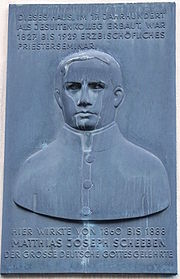
Matthias Joseph Scheeben
Encyclopedia

Meckenheim
Meckenheim is a town in the Rhein-Sieg district, in North Rhine-Westphalia, Germany. It is situated approx. 15 km south-west of Bonn.-References:...
near Bonn
Bonn
Bonn is the 19th largest city in Germany. Located in the Cologne/Bonn Region, about 25 kilometres south of Cologne on the river Rhine in the State of North Rhine-Westphalia, it was the capital of West Germany from 1949 to 1990 and the official seat of government of united Germany from 1990 to 1999....
, 1 March 1835; died at Cologne
Cologne
Cologne is Germany's fourth-largest city , and is the largest city both in the Germany Federal State of North Rhine-Westphalia and within the Rhine-Ruhr Metropolitan Area, one of the major European metropolitan areas with more than ten million inhabitants.Cologne is located on both sides of the...
, 21 July 1888) was a German Catholic theological writer and mystic
Mysticism
Mysticism is the knowledge of, and especially the personal experience of, states of consciousness, i.e. levels of being, beyond normal human perception, including experience and even communion with a supreme being.-Classical origins:...
.
Life
Scheeben studied at the Gregorian University at Rome under Carlo PassagliaCarlo Passaglia
Carlo Passaglia , Italian divine, was born at Lucca.Passaglia was soon destined for the priesthood, and was placed under the care of the Jesuits at the age of fifteen. He became successively doctor in mathematics, philosophy and theology in the university of Rome. In 1844 he was made professor in...
and Giovanni Perrone
Giovanni Perrone
Giovanni Perrone was an Italian theologian born in Chieri .He studied theology at Turin and at the age of 21 went to Rome, where he joined the Society of Jesus. In 1816 he was sent as professor of theology to Orvieto, and in 1823 was appointed to a similar post in the Collegium Romanum...
from 1852 to 1859 and lived in Collegium Germanicum. He was ordained to the priesthood on 18 December 1858. He taught dogmatic theology at the diocesan seminary
Seminary
A seminary, theological college, or divinity school is an institution of secondary or post-secondary education for educating students in theology, generally to prepare them for ordination as clergy or for other ministry...
of Cologne from 1860 to 1875.
Mysticism
Scheeben's mind reveled in speculating on Divine grace, the hypostatic unionHypostatic union
Hypostatic union is a technical term in Christian theology employed in mainstream Christology to describe the union of Christ's humanity and divinity in one hypostasis.The First Council of Ephesus recognised this doctrine and affirmed its importance, stating that the...
, the beatific vision
Beatific vision
The beatific vision - in Christian theology is the ultimate direct self communication of God to the individual person, when she or he reaches, as a member of redeemed humanity in the communion of saints, perfect salvation in its entirety, i.e. heaven...
, the all-pervading presence of God; he was a firm believer in visions granted to himself and others, and his piety was all-absorbing. Very few minds were attuned to his. His pupils were allegedly overawed by the steady flow of his long abstruse sentences which brought scanty light to their intellects; his colleagues and his friends but rarely disturbed the peace of the workroom where his spirit brooded over a chaos of literary matters.
Works
The list of Scheeben's works opens with three treatises dealing with grace:- Natur und Gnade. Versuch einer systematischen, wissenschaftlichen Darstellung der natürlichen und übernatürlichen Lebensordnung im Menschen. Mainz: 1861. (Nature and Grace. Trans. Cyril Vollert, SJ. St. Louis: Herder, 1954.)
- A new edition of Quid est homo by Antonius Casini, SJ (d. 1755), with introduction and notes. Scheeben's purpose was "To supply a patristic foundation for Nature and Grace" ..." (Vollert, "Foreword" to Scheeben's Nature and Grace x)
- Die Herrlichkeiten der göttlichen gnade. Freiburg: 1863. 8th ed. by A.M. Weiss, 1908. "... the work is popular in scope and became enormously successful. An English translation, The Glories of Divine Grace, appeared during Scheeben’s lifetime ..." (Vollert x)
- Mysterien des Christenthums. Freiburg: 1865–97. Trans. The Mysteries of Christianity. This is "... Scheeben's most famous book ... There is no other work quite like it in the vast history of Christian literature." (Vollert xi)
- Five pamphlets in defence of the Vatican Council, directed against Ignaz von Döllinger, Johann Friedrich von SchulteJohann Friedrich von SchulteJohann Friedrich von Schulte was a German legal historian and professor of canon law who was born in Winterberg, Westphalia. He was a leading authority on Catholic canon law....
, and other Old Catholics. - Handbuch der katholischen Dogmatik. 7 parts. Freiburg: 1873–87.
The author did not finish this last; he died whilst working on "Grace". The missing treatises were supplied in German by Dr. Leonhard Atzberger (Freiburg, 1898). In English the missing treatises were supplied by Wilhelm and Scannel, who whilst strictly adhering to Scheeben's thought, reduced the bulky work to two handy volumes entitled: A Manual of Catholic Theology based on Scheeben's Dogmatik (3rd ed., 1906).
Scheeben also wrote a two-volume work "Mariology," later translated into English.
He founded and edited (1867–88) the Kölner Pastoralblatt and edited for thirteen years Das ökumenische Concil vom Jahre 1869, later (after 1872) entitled Periodische Blätter zu wissenschaftlichen Besprechung der grossen religiösen Fragen der Gegenwart.
External links
- Mariology (Complete in one volume). Softcover. Hardcover.
Attribution

